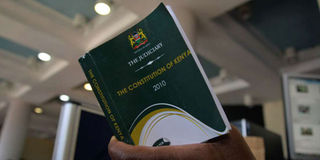Why 2022 general election is a myth

The Constitution is also clear on the term of Parliament. PHOTO | FILE | NATION MEDIA GROUP
What you need to know:
- It might be prudent for those preparing for the next general election to seek an interpretation of the Constitution in the High Court of Kenya.
- Article 102(1) states that the term of each House of Parliament expires on the date of the next general election.
A myth is defined as a widely held but false belief or idea.
A myth is a misconception, fallacy, misbelief or a false notion. The Kenyan body politic believes that the next general election in the country will be held on the second Tuesday of August in 2022. But that is a myth.
The Constitution, in Article 142(1), limits the term of the President. It states that the President shall hold office for a term beginning on the date on which the President was sworn in and ending when the person next elected President in accordance with Article 136(2)(a) is sworn in.
Article 136(2)(a) states that the President’s election shall be held on the same day as a general election of Members of Parliament (MPs), which is given as the second Tuesday of August in every fifth year, or in circumstances contemplated in Article 146, which deals with the vacancy in the Office of the President.
The election of MPs is also covered in Article 101(1). This clause also states that a general election of MPs shall be held on the second Tuesday of August in every fifth year.
KEY PHRASE
Article 180(1), on the election of the county governor, states that the county governor shall be directly elected by the voters on the same day as a general election of MPs, being the second Tuesday of August in every fifth year.
The key phrase in the Constitution pertaining to a general election is, thus “the second Tuesday of August in every fifth year”.
In determining the date of a general election, there will be a need to, first, know the date of the previous election, which becomes the date upon which any year count begins, and, secondly, understand the meaning of “every fifth year”.
This can only mean that four years have passed, the fifth year is current but has not elapsed.
Note that it does not say “after five years”— which is an indefinite and unknown period of time. The minimum period would be five years but the maximum period can range from five years and one day to the end of time.
PREVIOUS DATES
The first general election held under the 2010 Constitution was on March 4, 2013.
Four years after this election date fell on March 3, 2017. The fifth year began on March 4, 2017. The general election, under Article 101(1) and 136(2)(a), was then held on the second Tuesday of August of the fifth year, being August 8, 2017.
In 2017, the general election for MPs was held on the second Tuesday of August, this being August 8, 2017. The fourth year of this general election will, therefore, end on August 7, 2021. The fifth year will then begin on August 8, 2021.
Given that elections of MPs shall be held on the second Tuesday of August of the fifth year, which will fall on August 10, 2021. This date is dictated by Article 101(1) and 136(2)(a).
A general election being held the second Tuesday in August 2022 will, therefore, be an election in the sixth year of the general election, which the Constitution does not envisage.
I would not want to hazard a guess as to the origin of the myth of a general election being held on the second Tuesday of August 2022.
INTERPRETATION
It might be that there is a reading from different Articles in the Constitution or that there is a correct reading of the same Articles, but the Articles having different contents — meaning that there are different versions of the Constitution.
The Independent Electoral and Boundaries Commission (IEBC) is mandated to conduct the general election for MPs and it would be interesting to hear from them on which Articles of the Constitution they are using to prepare for it. The date, as interpreted by them, should also be of interest.
It might be prudent for those preparing for the next general election to seek an interpretation of the Constitution in the High Court of Kenya.
A similar thing was done in 2012, when those elected under the previous constitution sought an interpretation as to the end of their parliamentary terms and the date of the first general election under the 2010 Constitution.
The courts spoke, and the first general election under the current Constitution was set for March 4, 2013.
TENURE
The Constitution is also clear on the term of Parliament.
Article 102(1) states that the term of each House of Parliament expires on the date of the next general election. Article 102(2) deals with the extension of the term of Parliament when Kenya is at war.
If this interpretation of the general election date, as argued here is correct, then the 2022 polls will remain a myth or there will be a need to change the Constitution.
Dr Ayugi is a lecturer in the School of Surveying and Geospatial Sciences, the Technical University of Kenya. [email protected]




